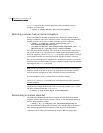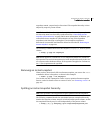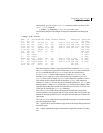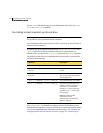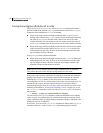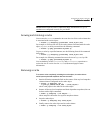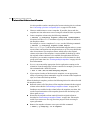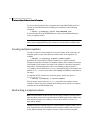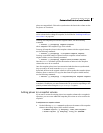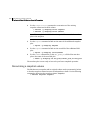
348 Administering volume snapshots
Creating traditional third-mirror break-off snapshots
Creating traditional third-mirror break-off
snapshots
VxVM provides third-mirror break-off snapshot images of volume devices using
vxassist and other commands.
Note: To enhance the efficiency and usability of volume snapshots, turn on
FastResync as described in “Enabling FastResync on a volume” on page 292. If
Persistent FastResync is required, you must associate a version 0 DCO with the
volume as described in “Adding a version 0 DCO and DCO volume” on page 356.
You need a full license to use this feature.
The procedure described in this section requires a plex that is large enough to
store the complete contents of the volume. For details of a method that uses
space-optimized snapshots, see “Creating instant snapshots” on page 319.
The recommended approach to performing volume backup from the command
line, or from a script, is to use the
vxassist command. The vxassist
snapstart, snapwait, and snapshot tasks allow you to back up volumes online
with minimal disruption to users.
The vxassist snapshot procedure consists of two steps:
■ Run vxassist snapstart to create a snapshot mirror.
■ Run vxassist snapshot to create a snapshot volume.
The
vxassist snapstart step creates a write-only backup plex which gets
attached to and synchronized with the volume. When synchronized with the
volume, the backup plex is ready to be used as a snapshot mirror. The end of
the update procedure is indicated by the new snapshot mirror changing its
state to SNAPDONE. This change can be tracked by the
vxassist snapwait
task, which waits until at least one of the mirrors changes its state to
SNAPDONE. If the attach process fails, the snapshot mirror is removed and its
space is released.
Note: If the snapstart procedure is interrupted, the snapshot mirror is
automatically removed when the volume is started.
Once the snapshot mirror is synchronized, it continues being updated until it
is detached. You can then select a convenient time at which to create a
snapshot volume as an image of the existing volume. You can also ask users to
refrain from using the system during the brief time required to perform the
snapshot (typically less than a minute). The amount of time involved in



